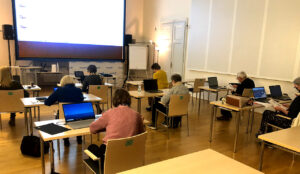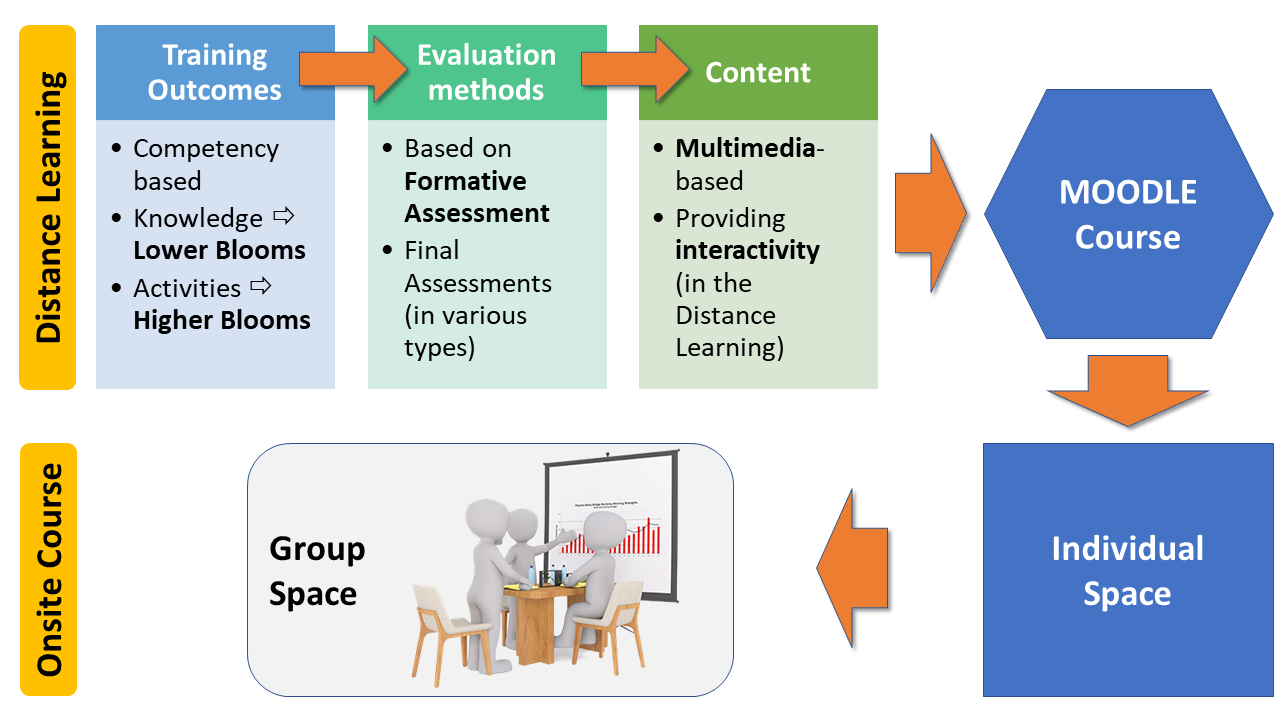The DISK training course is one major outcomes of this ERASMUS+ Project. The training course consists of modules focusing on specific subjects. The project team identified these subjects with a survey (which was conducted in 8 different European countries in the target group of adults and especially older adults). Among the innovations of this project, the use of the Flipped Learning Framework 3.0 and the implementation of the Self-evaluation Mandala are the two most important.
The 15 topics[1] focus on issues that play a role in everyday life. Two examples: The dealing with e-Government is a challenge for many adults, mainly older people. The same is with the incredible potential of the internet that many people do not take advantage of.
Training approach
 The selected training approach is competence-based and uses the Flipped Learning 3.0 Framework[2] with Blended Learning as the delivery method. In consequence, the team used a MOODLE Platform for the Distance Learning.
The selected training approach is competence-based and uses the Flipped Learning 3.0 Framework[2] with Blended Learning as the delivery method. In consequence, the team used a MOODLE Platform for the Distance Learning.
Training pilots took place in 3 different countries (Austria, Greece, Italy) addressing the specific target groups. Unfortunately, the optimized training concept could not be implemented in each situation due to the COVID-19 situation.
Competences
The development of the course modules made use of the Backward method, the standard approach in Flipped Learning. The Italian Partner Training2000 created a special form to describe the training framework. This document included the expected training outcomes, the methods to evaluate the training outcome, and the detailed description of the training content. Additionally, the training framework included the technical implementation of the content (described in typical MOODLE activities).
Use of the Flipped Learning 3.0 Framework
The basic approach used the Flipped Learning Framework 3.0. Backward Design plaid a crucial role in the concept of filling in the content into the training framework.
Following the depiction, the Moodle course enabled the pre-class for the participants and represents the Individual Learning Space. In logical consequence, the on-site training was the Group space.
Specific considerations
The structure seems to be easy, nevertheless, several crucial considerations were necessary to implement the training successfully.
The 187 Global Elements of Efficient Flipped Learning
Several elements of the framework have been explicitly used in the concept of the training. If you want to learn more about these elements, you may check this web page: FAdE[3] (Flipped Adult Education)
Instructions
The trainees must be able to access the Moodle course. Since the training addresses people with lower digital competencies, trainers must give tailored instructions to the trainees and practice the use of Moodle.
A special training at the beginning of the course helped the trainees to start. In a group space session, all participants learned to access the Moodle server. The trainers instructed them how to upload material (from assessments) and the trainees could practise these issues under supervision of the caretakers. Furthermore, the trainers explained the Self-evaluation Mandala and helped to download the graphic as a hands-on experience.
Basically, these instructions follow the elements “Explain How” and “Learn Tech Tools”.
Explain How
Explain to students how they can become effective Flipped Learners.
This is a crucial element in Adult Education. Flipped Learning is for adult learners, like “discovering a new continent”. However, some facts make it easier for them to change their learning style: they are used to taking on personal responsibility, they are more mature than young learners, and they are also highly motivated.
Nevertheless, the approach to Flipped Learning 3.0 is new land for most of them, and it takes some time to bring Flipped Learning 3.0 “on track”.
Learn Tech Tools
Learn how to create flipped videos and other flipped media using the tools at your disposal.
As mentioned above: Technology is not everything! But: Technology helps. It is a good idea to focus on tools that you are familiar with. Nevertheless, constant further development in working with technical means and learning useful new tools should be a matter of course.
Pre-Class has Big Idea
Jon Bergmann uses the term “Big Idea” in various context. For the Individual Space, he states:
Trainers are obliged to think hard about how a subject can best be conveyed. The Flipped Learning framework provides good ideas and practical instructions. But there should be more: a master plan, a brilliant idea – that’s the big idea!
The “big idea” also must be seen in context with the answer to the question: “What is the intended end?”
Clear Expectations
This is one of the 187 Global Elements of Efficient Flipped Learning. The definition is:
Learners (and trainers) must have clear expectations. This covers mainly the learning or training outcomes. Besides this, trainers must clear the procedures of the training from the beginning. Trainees must know: who has which responsibility, what must be done, and all the other organisational issues.
Meaningful Tasks
This term addresses another promising element:
Adult learners have a high motivated to learn. They often learn something they do not really need in everyday life, but from real interest. Examples are cooking courses, language courses to speak the local language during their holidays, or pottery courses. These people do not have any understanding of useless assignments or hardly understanding tasks. This will destroy the relationship to the trainer(s) as well as the learners’ motivation. It must be clear for learners why they do this assignment. If trainees cannot recognize their tasks or duties at the first glance, they mast get it explained.
Outcomes
Three adult education organisations, involved in this project, have implemented training courses with various modules developed during the project’s lifetime. Feedback is available from Greece (EDRASE), Italy (Training2000) and Austria (EBI).
Considering the target groups of the training, the courses were implemented in different environments. While EDRASE focused on the training with people in remote places and Training2000 provides the training for adults with minor digital competencies, the Austrian partner focused on people from the 65+ generation.
In all cases, the feedback showed that the concept was well done, and the trainees were highly satisfied with the offered training.
Conclusion
The modular concept turned out as a promising approach for training courses. Especially in situations, where tailored courses are necessary and individualization is asked, the DISK concept works great.
Additionally, the courses were the first practical implementation of the Flipped Learning concepts as developed in the Fade Project.
[1] See https://www.disk-project.eu/web/project-results-2/development-of-training-content/
[2] The Flipped Learning 3.0 Framework was developed by the Flipped Learning Global Initiative. One of the protagonists is Jon Bergmann, a pioneer in the “Flipped Classroom” and “Flipped Learning”. Further information: https://www.flglobal.org/learning-recovery-resources-funding-2/
[3] EDRASE was a partner in this project and transferred the findings to the DISK project.

